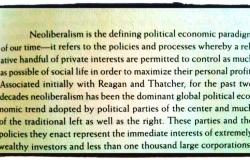A Response to Steve Fuller and Johan Soderberg: Are Neoliberalism and Social Democracy Becoming Indistinguishable?

Global Policy recently reposted two ‘think pieces’ by Steve Fuller (5th September 2018) and Johan Soderberg (7th September 2018) relating to the differences (or not) between neoliberalism and social democracy. They were reposted from the LSE’s EUROPP blog. In this response, Michael Tribe argues that Steve's comparison of neoliberalism and social democracy fails to adequately account for their economic dimensions.
Steve Fuller’s thesis is that neoliberalism and social democracy have been moving closer together and may have reached a point where they are virtually indistinguishable. This thesis originates in the ‘socio-political’ area of the social sciences, an area within which Johan Soderberg also works. Johan Soderberg’s piece relates particularly to the UK university sector, which was the subject of an exchange of views at an earlier event. However, neither ‘opinion’ piece mentions details of the origins of economic neoliberalism in the 1947 meeting of the Mont Pèlerin Society (MPS) during which their very influential statement (agreed at that meeting) was drafted by Lionel Robbins (who is mentioned in the second of the two pieces – but in the context of his report on the UK Higher Education sector). It should be noted that Soderberg makes it very clear that he does not agree with Fuller’s thesis.
My view is that Steve Fuller’s piece significantly misrepresents the distinction between neoliberalism and social democracy in terms of both errors of fact and in terms of major omissions within the ‘big picture’ of the two ideological schools of thought. At a basic level, neoliberalism highlights individualism while social democracy highlights collectivism – although this simple dichotomy probably belies a slightly more complex reality. This brief comment will be focussed on the economic dimension of society, although I recognise that the literature on neoliberalism and on social democracy covers a much wider range of dimensions.
The 1947 meeting of the MPS was attended by a group of ‘high-flying’ economists and social scientists, including Milton Friedman and Friedrich von Hayek. Friedman and von Hayek were, of course, very much the trail-blazers for the development of Thatcherism and Reaganomics in the 1980s – which are currently seen as the epitome of economic neoliberalism in a ‘practical’ policy sense. I think that it will be agreed that at this time – the 1980s – there was ‘clear water’ (to use a competitive rowing analogy) between economic neoliberalism and social democracy. The question is whether the two have moved closer together in more recent years, particularly during the Blair and Brown Labour governments in the UK of the late 1990s and the first decade of the 2000s.
There are two areas within the economic dimension where I believe there is still extremely clear water between neoliberalism and social democracy. The first is in the treatment of income distribution, which includes the areas of poverty and welfare policy. The second is the analysis of market failure and of appropriate policy measures to correct for such failure.
The 1947 statement off the (MPS) does not explicitly refer to income distribution, poverty or welfare policy. There is a very good reason for this. The MPS statement, which can be regarded as the basis of economic neoliberalism, makes it clear that ‘market primacy’ is at the centre of its philosophy and ideology. If the market is of prime importance then the income distribution is a result of market interactions and must, therefore, be largely unquestionable. There are echoes of this in some contemporary views (2018) of the extremely high rewards received by high-income bankers and ‘captains’ of industry in developed industrial countries, and in the extremely low rewards received by the lower paid in these countries. Poverty is equally unquestionable within economic neoliberalism, being an outcome of the market, and being regarded by neoliberals – to a large extent – as due to shortcomings of the individuals who are suffering from poverty rather than from shortcomings of the economy and of society (the latter being the position of social democrats). Social democrats can be regarded as taking an almost diametrically opposed view to the neoliberal interpretation of income distribution and associated policy. Social democrats perceive poverty as requiring state intervention in order to improve the condition of the ‘poor’, and they also see state intervention as being justified in order to attempt to reduce extremely high incomes for the aforementioned bankers and ‘captains’ of industry.
The respective views of economic neoliberals and of social democrats concerning market failure are directly analogous to those outlined above which relate to income distribution, poverty and welfare policy. In economic neoliberalism, if the market has the prime position, and the outcomes are essentially unquestionable, then there can be no such thing as market failure. State intervention, such as that undertaken in order to correct for market failure, should be minimised, avoided at all cost, and be decried according to the principles of economic neoliberalism. However, there is a well-established and highly respectable economic literature on market failure and measures which can be taken to compensate for it. Market failure arises due to a) the existence of economic externalities which are not compensated automatically through the market, b) the existence of monopoly and monopsony power, c) the lack of any market for the products or services which are being provided (e.g. what economists refer to as ‘public goods’), d) imperfect information (absence of information, false information or asymmetric access to information) which leads to ‘imperfect’ decisions in the marketplace, and e) where the market contributes to an unacceptable outcome (e.g. narcotic drugs). The area of market failure is well-represented in the contemporary debates between environmental analysts and climate change deniers.
If my arguments are largely in the correct ‘ball park’ then why does Steve Fuller appear to be taking a markedly different view of the distinctions between neoliberals and social democrats? My feeling is that much of the reason lies in the recent development of the social sciences in western society and more specifically within universities. When I was an undergraduate student in the mid-1960s economics was fairly firmly placed within the social sciences. Since then economists have tended to relocate themselves within Business Schools, removing themselves from the circle of the social sciences. Equally, other social scientists have tended to dissociate themselves from economics so that there is less interaction. It is therefore not so surprising to read a discussion about neoliberalism between social scientists which does not mention the economic dimension. However, in terms of political analysis, surely the fact that neoliberal economic policy has gained such hegemony across the planet means that the economic dimension has to be accounted for within any serious comparison of neoliberalism and social democracy.
Dr Michael Tribe , Honorary Lecturer, Department of Economics, University of Strathclyde and Business School Affiliate, Adam Smith Business School, University of Glasgow.
This comment is informed, inter alia, by a reading of chapters in Philip Mirowski and Dieter Plehwe (eds.) (2009) The Road from Mont Pèlerin: The Making of the Neoliberal Thought Collective (Cambridge MA: Harvard University Press); Dani Rodrik (2002) After Neoliberalism, What? Remarks made at the Alternatives to Neoliberalism Conference in Washington May 23-24, 2002 sponsored by the New Rules for Global Finance Coalition; Joseph Stiglitz. (2004) The Post Washington Consensus Consensus, Initiative for Policy Dialogue Working Paper (Columbia, MA: Columbia University); and Gerald Meier (1995) X.B.2 Market Failures – Note. In Leading Issues in Economic Development (6th ed.). New York: Oxford University Press: 540-542. I wish to thank my brother, Keith Tribe, for his comments on an earlier draft of this comment – he is one of the contributors to the volume edited by Mirowski and Plehwe.
Image credit: dom brassey draws comics via Flikr (CC BY-SA 2.0)


